Jeremy Sweeten and his family farm in the Eastern Upper Peninsula of Michigan. A predominant part of their operation is regeneratively grazing cattle on 400 acres of native and improved pasture. Jeremy and his wife Michelle, both first generation farmers, manage their herd of cow/calf pairs year-round. During the summer they retain the weaned calves as stockers and sell them in the fall to be grass-finished. Another part of the operation is 800-1,000 acres of Timothy hay with some of it being produced for the horse market and the lower quality hay used to supply the beef herd with winter feed. The farm is a great place for the Sweeten’s to raise their four children and teach them that food doesn’t come from a grocery store. There are also mules, donkeys, horses and border collies scattered around the farm. There is never a dull moment.
In 2000, Jeremy obtained dual Bachelor of Science degrees in agricultural systems management and agronomy and in 2003, he earned a Master of Science degree from Purdue University in agronomy, specifically forage crop management. For the past 10 years, Jeremy also worked off the farm for CISCO Seeds as a forage agronomist. His passion is helping farmers and ranchers solve problems through his practical experience and education. Regenerative agriculture has become an important part of his life.
I enjoy hunting whitetails and turkeys in northern Michigan and mule deer, elk and antelope in the western states. There is usually some type of hay equipment or old tractor in my shop getting repaired or refurbished. I have 11 years of fire service, currently serve on the Rudyard Volunteer Fire Department and have committed my life to following and serving Christ.
Farming in the UP has many challenges, but I’ve seen, firsthand, how regenerative farming practices have improved the soils, livestock and profitability for my family. Working for Understanding Ag is a great stride in my lifelong learning process and I look forward to working with my fellow farmers to help them achieve their farming and family goals through the application of time-tested, soil health-building regenerative farming principles and practices.
Jeremy Sweeten

